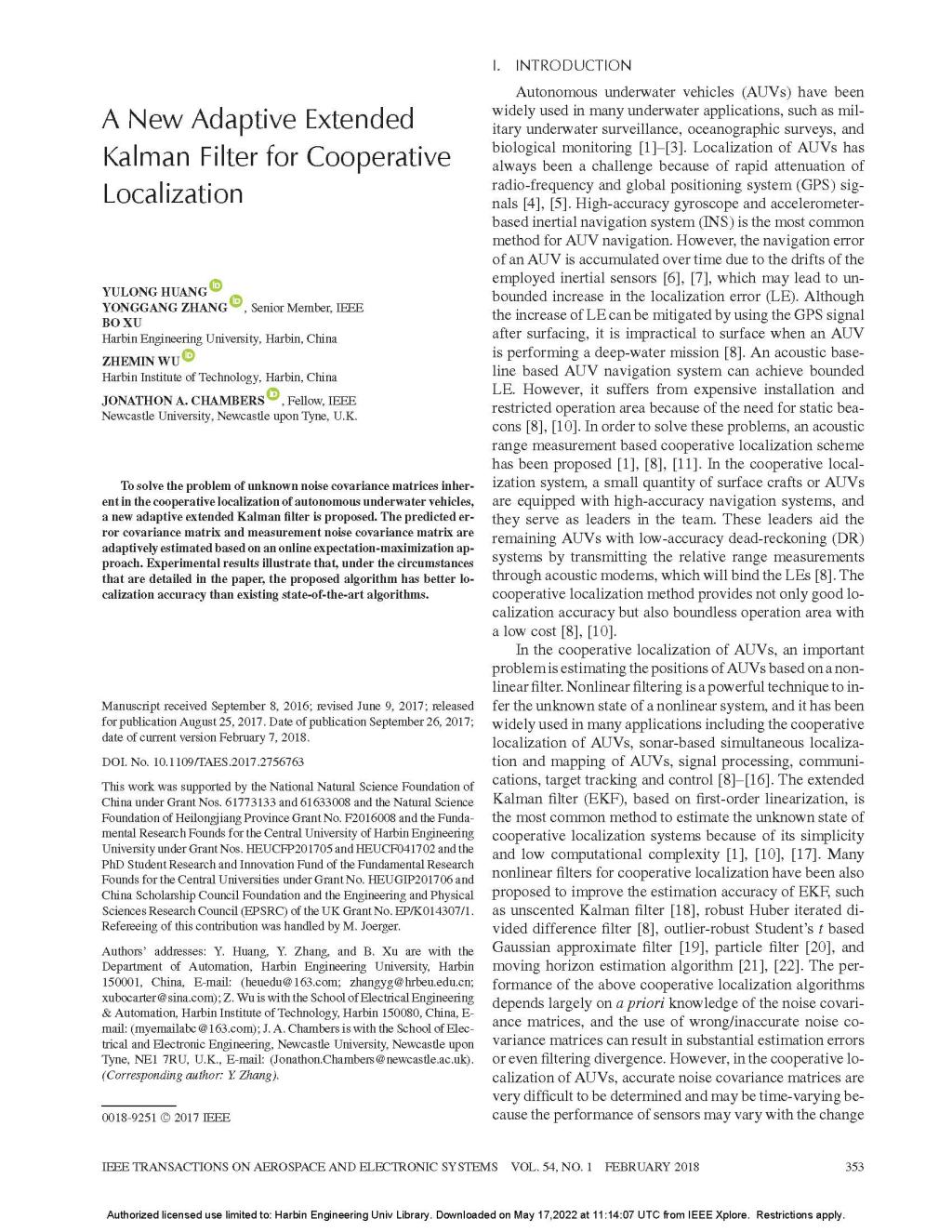Recently, Huang Yulong, Zhang Yonggang, Xu Bo, young teachers from the School of Intelligent Science and Engineering of our University and the Navigation Instrument Engineering Research Center of the Ministry of Education, and visiting professors of our university and Academician Jonathan Chambers of the Royal Academy of Engineering in the international top journal IEEE Transactions On Aerospace and Systems (IEEE Transactions On Aerospace and Electronic Systems) "A Novel Adaptive Extended Kalman Filter for Collaborative Localization," co-published by Electronic Systems, won the IEEE Barry Carlton Award for Best Paper of 2018. This is the first time that a university in mainland China has won the IEEE Barry Carlton Award since it was established in 1958. This award is the second IEEE Barry Carlton Award awarded to Professors Huang Yulong and Zhang Yonggang after they won the IEEE Barry Carlton Honorary Nomination Award in 2021.



High precision Underwater navigation and positioning is the prerequisite and key for Autonomous Underwater Vehicle (AUV) to complete the task successfully and return safely. Due to the severe attenuation of GPS signal in water, how to achieve accurate AUV underwater positioning in GPS-denied environment becomes a challenging problem. AUV underwater positioning is usually realized based on inertial navigation system. Due to the error of inertial devices, the positioning error of pure inertial navigation will increase with the accumulation of time. To solve this problem, the collaborative positioning method provides a feasible solution for the AUV cluster's high-precision underwater collaborative positioning by integrating the inertial navigation output and the relative ranging information of the adjacent AUV. In the actual collaborative location scenario, the prior information of noise covariance is often time-varying or unknown, which will lead to the decline of information fusion accuracy. The winning paper redesigns the fusion scheme from the perspective of Bayesian estimation, and uses the expectation maximization method for the first time to jointly estimate the one-step prediction covariance matrix and the measurement noise covariance matrix online, and obtains a novel adaptive extended Kalman filter with simple calculation and suitable for practical engineering applications. The simulation experiment of AUV cooperative positioning proves that the proposed method has strong adaptive adjustment ability to the time-varying noise environment, reduces the dependence on prior information, and has been widely praised in the academic and engineering fields.

Professor Michael Rice, Editor-in-Chief of IEEE Transactions on Aerospace and Electronic Systems, commented in nominating the paper that "This paper addresses the problem of declining positioning accuracy of AUV collaborative positioning in the case of imprecise prior parameters by jointly estimating the one-step prediction covariance matrix and the measurement noise covariance matrix." The writing of the paper is smooth, the language is concise, to the point, the mathematical formulas and symbols are standardized and easy to understand, and has been highly recognized by international peers and a lot of citations. The high quality of this paper reflects not only the innovation of the authors, but also the great influence of the IEEE Transactions on basic research and applied science." In nominating the paper for the IEEE Barry Carlton Award, Professor Georg Mathieu, Senior editor of Navigation in IEEE Transactions on Aerospace and Electronic Systems, and the IEEE Society for Aerospace and Electronic Systems Publishing team commented that "the main strength of this paper is its strong experimental demonstration, The main contribution is the proposed adaptive extended Kalman filter based on the expectation maximization method, and the innovation is the adaptive estimation of the one-step prediction covariance matrix rather than the state noise covariance matrix."
IEEE Transactions on Aerospace and Electronic Systems is the top journal in the field of aerospace and navigation, and has been rated as the top journal of the Chinese Academy of Sciences for many years. Established in 1958, the IEEE Barry Carlton Award is one of the oldest awards of the IEEE Society. It is selected once a year to recognize the best papers of the year published in IEEE Transactions on Aerospace and Electronic Systems four years ago. The paper ranked first in the selection is awarded the IEEE Barry Carlton Award. The second-placed paper received the IEEE Barry Carlton Honorary Nomination Award.
